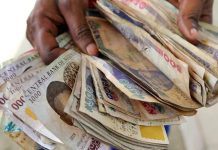Because of increased interest rates on Treasury Bill instruments issued at a recent Central Bank primary market auction, investors dumped naira assets, which resulted in a decrease in the market price of Federal Government of Nigeria (FGN) bonds.
In the market for fixed-income instruments, rates have continued to rise above the rate of inflation. This week, the Statistics Office is anticipated to reveal the January inflation results. Analysts have forecast that the consumer price index will depreciate much more following the last round of Naira depreciation through adjustments to the FX spot rate pricing mechanism by FMDQ.
According to an update from traders at Afrinvest, the domestic bond market moved lower during the most recent week as investors were drawn away by the substantial yield repricing in the T-bills category. Support existed for the selloffs by higher spot rates pricing at the Treasury bills auction conducted by the apex bank where the authority sold 364-day bills for 19%.
A total of 52,338 units of FGN bonds valued at N51.123 million were traded in 31 deals compared with a total of 98,426 units valued at N95.304 million transacted in 60 deals in the previous week, Cedrus Capital said in a note.
Consequently, daily trade ended in the red on all trading days save for a flat outing on Friday, pushing the average yield 96 basis points higher to 15.7% week on week, traders said. The short-end bonds saw the most selloffs as the average yield increased by 156 basis points while the yield on the mid and long-end bonds climbed 48 and 88 basis points respectively.
Asset managers, authorised dealers and other market players exited short positions following hints from the CBN Governor about potential increases in short-term interest rates. As a result, the average yield climbed, while FGN bond prices declined.
Across the benchmark curve, the average yield expanded across the short (+127bps), mid (+30bps), and long (+78bps) segments. The shift in the yield curve was due to the profit-taking activities on the MAR-2024 (+471bps), JUN-2033 (+118bps) and APR-2034 (+227bps) bonds, respectively.
Traders said they expect money policy administration globally and domestically, and sustained imbalance in the demand and supply dynamics to shift yields upwards over the short term.











